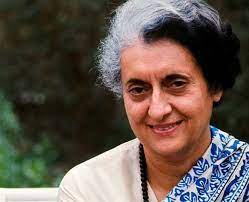Indira Gandhi: A Visionary Leader Who Shaped India’s Destiny
Indira Gandhi, the first woman Prime Minister of India, was a trailblazer who left an indelible mark on the country’s political landscape. Her visionary leadership, resilience, and political acumen reshaped India’s destiny during a crucial period in its history. From her early political engagements to her bold decisions as Prime Minister, Indira Gandhi’s legacy continues to inspire and influence leaders and citizens alike.
Early Life and Political Journey
Born on November 19, 1917, in Allahabad, Uttar Pradesh, Indira Gandhi hailed from a family deeply entrenched in Indian politics. Her father, Jawaharlal Nehru, was an influential figure in the Indian National Congress and played a central role in India’s struggle for independence. Growing up in a politically charged environment, Indira imbibed the values of democracy, equality, and social justice from an early age.
Indira Gandhi’s political journey took shape as she actively participated in the freedom movement and worked closely with her father. She organized padyatras (marches) and played a significant role in mobilizing the masses. Her political astuteness and dedication earned her a place in the inner circles of the Indian National Congress.
Contributions as Prime Minister
Assuming office as India’s Prime Minister in 1966, Indira Gandhi navigated the country through tumultuous times with determination and resolve. Her tenure witnessed significant transformations across various domains, paving the way for a stronger and more vibrant India.
Championing Indian Nationalism
Indira Gandhi staunchly upheld the principles of Indian nationalism, following in the footsteps of her illustrious father. She undertook measures to consolidate the nation, promoting a strong sense of unity and pride among diverse communities. Her policies aimed at preserving India’s sovereignty and protecting its interests, both domestically and internationally.
Leadership During the 1971 Indo-Pak War
One of Indira Gandhi’s defining moments was her decisive leadership during the 1971 Indo-Pak War. Confronted with the humanitarian crisis in East Pakistan (now Bangladesh), she authorized India’s military intervention. The war resulted in the liberation of Bangladesh and India’s stature in the global arena soared. Indira Gandhi’s unwavering commitment to democracy and support for oppressed nations earned her international acclaim.
Economic Reforms and Self-reliance
Indira Gandhi implemented economic reforms that emphasized self-reliance and indigenization. Her policy of nationalization aimed to strengthen key industries, ensuring control and equitable distribution of resources. Initiatives such as the Green Revolution and the establishment of institutions like the Steel Authority of India helped bolster industrial growth and agricultural productivity, leading to a more self-sufficient India.
Empowerment of Marginalized Sections
Indira Gandhi championed the cause of the marginalized sections of society. She introduced policies and welfare programs that focused on eradicating poverty, reducing inequality, and empowering women. Her efforts paved the way for economic and social upliftment, ensuring a more inclusive society.
Nuclear Program and Foreign Policy
Indira Gandhi’s leadership witnessed India’s emergence as a nuclear power. She made bold decisions regarding India’s nuclear program, recognizing the importance of defense preparedness in a volatile geopolitical environment. Her foreign policy strategies emphasized maintaining strategic alliances while pursuing an independent course in international affairs.
Legacy and Inspirational Leadership
Indira Gandhi’s impact on India’s political landscape is undeniable. Her strong leadership, resilience, and determination in the face of challenges have inspired generations of leaders. However, her tenure also faced criticism for imposing emergency rule in 1975, which curtailed civil liberties.
Indira Gandhi’s contributions were recognized and honored during her lifetime. She received the Bharat Ratna in 1971, the highest civilian honor in India, for her exceptional leadership during the Indo-Pak War.
Conclusion
Indira Gandhi’s tenure as Prime Minister marked a transformative period in India’s history. Her visionary leadership, determination, and ability to make bold decisions shaped India’s destiny and left an indelible mark on the nation. While her legacy continues to be debated, there is no denying her impact on the socio-economic, political, and defense sectors of India. Indira Gandhi’s inspirational leadership legacy serves as a reminder of the transformative power of strong, visionary leadership.


